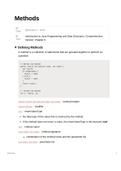Class notes
Class notes | Methods | Intro to Computer Programming (COMP150) Introduction to Java Programming and Data Structures, ISBN: 9780134670942
- Course
- COMP 150 (COMP150)
- Institution
- University Of The Fraser Valley (UFV)
Typed Notes on Java Methods, including standard code forms and sample code blocks
[Show more]



